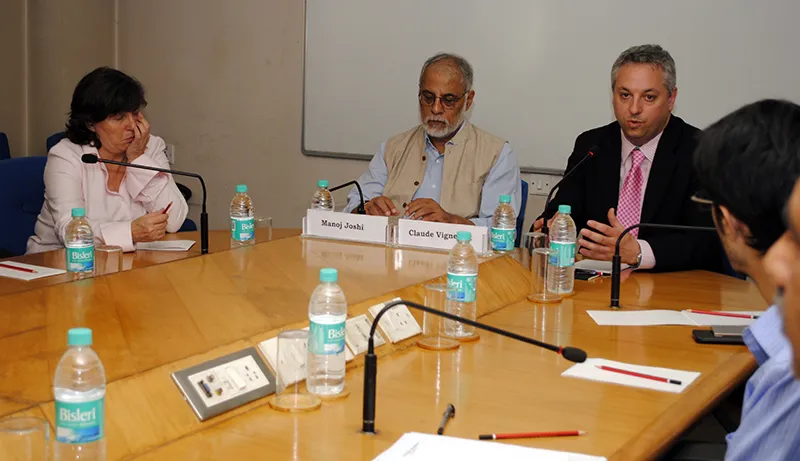Canada's Deputy NSA Claude Vigneault says his country's decade-old presence in Afghanistan as part of American coalition has given them a better sense of India's security concerns and is keen to collaborate with it.

Canada is interested in developing its security collaboration with India given their presence in the region for over a decade as part of the American coalition in Afghanistan, according to Canada’s Deputy NSA Claude Vigneault.
Participating in an interaction at Observer Research Foundation on April 26, 2013, Claude Vigneault said Canada’s presence in the region has given them a better sense of India’s security concerns. He felt Canada and India have the opportunity to expand their relationship and establish a base to tackle national security issues such as terrorism and cyber security.
During his interaction with the ORF faculty, organised to understand better the security challenges facing the two countries and the region, some of the topics discussed were terrorism, nuclear proliferation, Pakistan, the continued uncertainty in Afghanistan and the complex relationship with China.
Canada’s interest in better understanding the security structure in the region also emanates from the large South Asian diasporas that currently reside in that country. It was revealed at the interaction that Canada too, like India, faces multiple security threats. However, Canada has also been able to develop a positive relationship with its minority communities. It was pointed out that while there is a rise in the ’Islamophobia’ in the western world, Canada has focused on engaging with the Muslim community in the country so as not to alienate them.
In the South Asian ambit, the issue of the prevalent human rights situation in Sri Lanka was also raised. Canada is of the belief that the present government in Colombo is not acting sufficiently to address local and global concerns. The Canadian government is just responding to the voices of the huge Tamil population in Canada by taking a strong stance on the issue. However, it was also noted that Canada will not allow its territory to be used by the LTTE to regroup.
Regarding the question of climate change and Canada’s opinion on the matter, it was said that Canada realised the need to evolve its present perspective on the issue, taking into consideration Canada’s relationship with the US and its business interests. It was clearly explained that given Canada’s interests being closely aligned to the US’, Canada could not afford to have an approach which is different from its neighbour.
Another important topic of discussion was the evolving situation in Afghanistan and Canada’s interest in cooperating with India to deal with the issues in the country. The discussions concluded that while a transition to a successful stable democracy was unlikely, there was no reason to believe that Afghanistan will descend into chaos. India is deeply engaged in the Afghanistan at the diplomatic and civil level. It is unlikely that India will have military engagement in the country, though it will be hard to refuse if Kabul makes a direct request.
Furthermore, the discourse on Afghanistan greatly involves Pakistan’s actions in Afghanistan, and also developments within Afghanistan itself. As the situation on Pakistan unravels, it will have a profound effect on the ground reality in Afghanistan. These concerns have been accentuated by statements being made by the military brass in Rawalpindi.
There are serious concerns regarding the Afghan government’s capability to maintain control in the country post-2014. Given the memory of the aftermath of supporting the mujahideen forces in the 1980s and 90s, Canada has been sceptical about giving weapons to the Afghan government. It was explained that the funding of the Afghan government and its security forces will be crucial in encouraging stability in Afghanistan. The past example of the Najibullah government is a testament to that reality. Furthermore, all concerns regarding Afghanistan not being a unified nation-state was also dispelled. The fact that Afghanistan has been a nation-state, even though strongly decentralised, even before India and Pakistan became so was emphasised.
In understanding the problems in Afghanistan, it was noted that narcotics trade proved to be one of the major concerns. Given the numerous stakeholders who were directly or indirectly involved in the trade, it was unlikely that this problem would be resolved in the near future.
In conclusion, Canada’s possible contributions to India were elucidated. As the situation with Iran become increasingly complicated, Canada could prove to be an alternate energy provider for India. Canada’s natural resources could be accessible to India as well. Canada has the capability to augment food security capacity in India by helping construct cold storage facilities.
Collaboration in education is an important area of cooperation which was mentioned. With there being more than 13,000 Indian students travelling to Canada every year, the two countries can seek to exploit joint opportunities. These opportunities are already being enhanced by the numerous MoUs that have entered into by both sides.
Another important factor for collaboration that was talked about was the business ethics of democratic countries. While China has made large investments in Canada, it is not necessarily welcome as China does not respect intellectual property rights and has a tendency to dictate terms. Working with a democratic country like India would imply that given the rule-based system that the two countries follow, disagreements and discords can be amicably resolved.
(This report is prepared by Arvind John, Research Assistant, Observer Research Foundation, Delhi)
The views expressed above belong to the author(s). ORF research and analyses now available on Telegram! Click here to access our curated content — blogs, longforms and interviews.




 PREV
PREV

